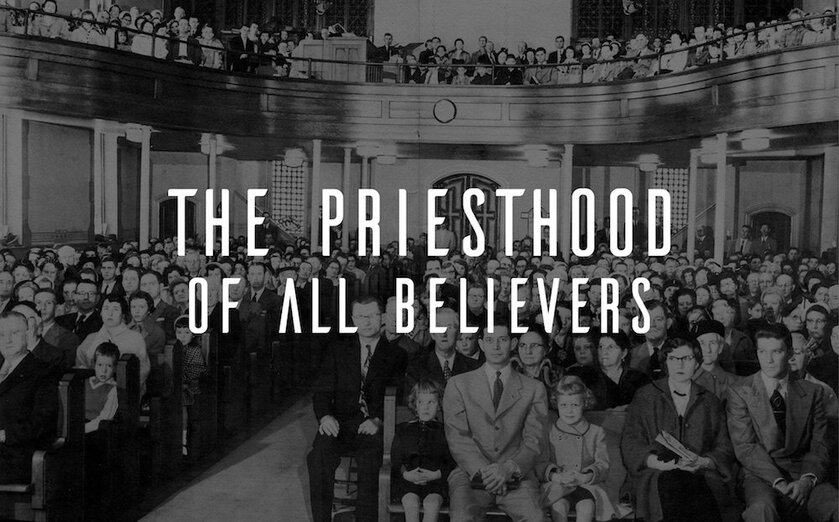The Message of This Salvation: Ordained Grace, Convicting Surrender, and Eternal Fellowship in Acts
Acts 13:26
"Brothers, sons of the family of Abraham, and those among you who fear God, to us has been sent the message of this salvation."
Paul and Barnabas had been invited to speak after the reading of the Law and Prophets. Paul begins by recounting Israel’s history, from the exodus to King David, to build a bridge to Jesus as the promised Savior. Jesus the Messiah, the promised Savior and builder of the faith. The fulfillment of the prophets, and they executed him. But God raised him from the dead.
In a theological sense, some interpretations view Jesus Christ as the ultimate builder of God’s house, referring to the spiritual temple of the church rather than a physical structure (Matthew 16:18 and Hebrews 3:1-6). This spiritual temple is built upon the resurrection which is the central theme of our faith.
Acts 13:32-33
"And we bring you the good news that what God promised to the fathers, this he has fulfilled to us their children by raising Jesus, as also it is written in the second Psalm,
"‘You are my Son, today I have begotten you.’"
God's ultimate glory is fulfilled in his Son, our Lord Jesus Christ.
Acts 13:39
"and by him everyone who believes is freed from everything from which you could not be freed by the law of Moses."
Paul’s sermon masterfully weaves Old Testament promises into the Gospel, showing how Jesus isn’t just a historical figure but the living cornerstone of faith. Paul traces Israel’s history to David, positioning Jesus as the promised descendant who brings salvation. After declaring Jesus’ execution and resurrection, Paul pivots to the "good news", the resurrection of Jesus Christ which fulfills God’s ancient promises to the "fathers" (like Abraham and David).
And following that day of revelation, on the next Sabbath, Paul and Barnabas continue to make the good news known and understood. And he expounds on a critcal theme for these Galatians. They had judged themselves as they had judged Jesus Christ. Pilate said, "what shall I do with this Jesus who is called Christ?" He made his judgement and in doing so, he judged himself. And this is the case for EVERY man, woman, and child. Each must judge for themselves what to do with this gospel of Jesus Christ.
Acts 13:46
"And Paul and Barnabas spoke out boldly, saying, "It was necessary that the word of God be spoken first to you. Since you thrust it aside and judge yourselves unworthy of eternal life, behold, we are turning to the Gentiles. For so the Lord has commanded us, saying,
"‘I have made you a light for the Gentiles, that you may bring salvation to the ends of the earth.’"
Every one of you must face that question.
What are you going to do with Him?
Whatever you do will determine YOUR destiny. Not His. This underscores the eternal stakes. Our response to Jesus doesn’t alter His lordship but seals our own destiny.
This universalizes the Gospel: every person; Jew, Gentile, ancient or modern, faces the same question. As Jesus said, "Whoever believes in him is not condemned, but whoever does not believe is condemned already" (John 3:18). Our response to the risen Christ, the living cornerstone, builds or rejects our place in God’s spiritual house.
1 Peter 2:6-7
For it stands in Scripture:
"Behold, I am laying in Zion a stone, a cornerstone chosen and precious,
and whoever believes in him will not be put to shame."
So the honor is for you who believe, but for those who do not believe,
"The stone that the builders rejected
has become the cornerstone,"
This aligns with Jesus as the "ultimate builder of God’s house". The spiritual temple, the church, is constructed not on ethnic lines but on faith in the resurrected Son. Not on traditions and successive councils, but built upon the faith, the acceptance of the resurrection unto eternal life in grace through Jesus Christ. Rejection of this faith excludes one from this house, but acceptance incorporates us as "living stones" (1 Peter 2:5), destined for God’s glory fulfilled in Christ. This combats the legalism of the priesthood with freedom that comes through faith, not works (Galatians 2:16), and rejecting it means forfeiting eternal life.
This isn’t fearmongering but an invitation to life. In a world of distractions, Acts 13 calls us to bold acceptance. And take a look at what came from this bold preaching...
Acts 13:48
"And when the Gentiles heard this, they began rejoicing and glorifying the word of the Lord, and as many as were appointed to eternal life believed."
Did you see it?
Try this version:
Act 13:48 (ASV)
"And as the Gentiles heard this, they were glad, and glorified the word of God: and as many as were ordained to eternal life believed."
See it now?
This phrasing in this verse underscores God’s sovereign hand in salvation while tying beautifully into the themes we’ve been exploring; faith in the resurrected Christ as the foundation of God's spiritual house, freedom through grace, and the personal decision that determines our destiny.
The word "appointed" (Greek: tetagmenoi, from tassō) is in the passive voice in most translations, suggesting an external arrangement or ordination. It carries a sense of divine decree. From the Calvinist perspective, they see this verse as evidence of unconditional election. God sovereignly appoints or ordains specific individuals to eternal life before creation, based on His will alone. And therefore our belief follows as a result of this divine appointment, not its cause.
From an Arminian perspective, "appointed" is often interpreted in the middle voice. The believers "set themselves" toward eternal life, emphasizing their human response enabled by God’s prevenient grace which draws them into that connection.
I think my view is somewhere in between. I think we are ordained by God's prevenient grace in that God has irresistibly drawn us to believe and be saved. Let's see if I can articulate this in a meaningful way.
Prevenient grace is God’s universal enabling grace that precedes and awakens the will, countering total human depravity but remaining resistible. People can still accept or reject it through free choice. Yet it's "foreseen faith", God’s foreknowledge of who will freely receive the prevenient enabling grace is built into that gift of faith. So, in one sense God’s sovereign call regenerates the heart and prepares it for receiving Him. But does this mean He is leading inevitably to faith and salvation?
My middle way idea is like "convicting grace," replacing strict irresistible or prevenient models with a dynamic where God’s Spirit convicts and draws in a way that’s both sovereign and responsive. This best describes my experience, my so called, "sudden conversion" or "sudden awakening". It's a congruent harmonius grace that almost feels compelled but isn't because there absolutely was a surrendering on my part. I absolutely fell to my knees and begged for forgiveness and professed that I no longer want to be god.
It's a "convicting grace" that’s compelling yet not coercive. I absolutely had a choice to continue in my depravity and maybe even lean harder into it. I absolutely could have dove headfirst into it. But a sudden, unexpected, knee-falling repentance and declaration of yielding control overturned my desire and became my refuge. From that day going forward I have been irresistibly compelled to strive toward Christ's will. It's a divine drawing that’s so profound it feels compelling, yet it honors our freedom, leaving room for that pivotal choice.
Some might say the Spirit’s conviction led to a surrender that flipped everything, knees to the ground, self-rule dethroned, and Christ enthroned as Lord. It may have felt like a choice but it was ordained and anointed by God. But as I see it, before I relinquished myself God did not immediately intervene. Why? If it is inevitable, why not at birth? Why should anyone strive? Why go through any kind of spiritual journey? Why, if salvation feels inevitable in hindsight, God doesn’t orchestrate it from birth or bypass the striving altogether.
This cuts to the core of one of theology’s deepest mysteries; the interplay of God’s sovereign ordination, human free will, the timing of His intervention, and the value of our spiritual journeys.
I understand awakening faith, prevenient grace which draws me closer to believing. And I understand that some do not believe or even notice His voice. And I understand that while I'm having my heart softened, my circumstances are shaping my outlook. And I understand that often God waits for our conscious response to make the surrender more meaningful. Maybe all this tension is necessary because were salvation automatic at birth, it might negate the relational aspect of our faith, our voluntary love, trust, and surrender to Christ as Lord. God indeed has foreknowledge and makes a way for a journey where we learn to seek Him.
Jeremiah 29:13
"You will seek me and find me, when you seek me with all your heart."
Forcing it at birth could make us puppets, not beloved children who choose refuge in Him, suggesting God orchestrates awakenings for maximum redemptive impact. Apparently God delays or allows striving for His greater glory. And it's true, in pre-conversion life, we experience the futility of our self-rule which then makes grace’s intervention even more astonishing, like the prodigal son’s return amplifying the father’s love (Luke 15:11-32). And post-conversion reflection on who we were often affirms our faith and appreciation for what we've become in Christ. So God's timing builds faith, encourages faith, and I suppose it must be said that He establishes faith, thereby turning our pre-conversion futility into a testimony of His astonishing grace.
God's ordained grace doesn’t just rescue us; it reshapes us, making post-conversion gratitude a wellspring of deeper faith. His desire becomes our desire. His objectives become our objectives. We are in communion with God.
Ephesians 2:10
"For we are his workmanship, created in Christ Jesus for good works, which God prepared beforehand, that we should walk in them."
He establishes faith not as a mechanical process but as a living masterpiece, where our surrender meets His eternal plan.
So yeah!
I surrendered, and that's what He ordained. He's not surprised by my surrender, He established it. Surrender isn’t a random act that catches God off guard; it’s woven into His ordained plan, where our yielding becomes the very masterpiece, He crafted before we even knew what we should pray.
Romans 8:28-30
"And we know that for those who love God all things work together for good, for those who are called according to his purpose. For those whom he foreknew he also predestined to be conformed to the image of his Son, in order that he might be the firstborn among many brothers. And those whom he predestined he also called, and those whom he called he also justified, and those whom he justified he also glorified."
It's all Him going to prepare a place for those who love Him. We're being prepared for fellowship with Christ. He'll come to receive us so we'll be with Him. It's all about this unending fellowship with God, which it turns out has always been the case in His prevenient love.
It's the gospel Paul preached there in Acts 13. The unbreakable sequence of God’s sovereign work in redeeming His people. From eternity past to future glory. His initiative, His preparation, His pursuit. All things working together for His good.
It's all Him...yet our love. That love comes from us. It began with Him loving us, but now we return that glory to Him. It’s all Him initiating, pouring out prevenient grace that awakens our hearts, yet in that mystery, our response; our love, our surrender, becomes a genuine offering, returning the glory right back to its Source. And that's the fellowship He always offers to those whom He has called. Our love, sparked by His, echoing into eternity.
Prayer:
Lord Jesus, thank You for Your sovereign grace that draws us irresistibly yet tenderly into surrender and fellowship with You. Awaken our hearts to love You more, as we return the glory that began in Your eternal love. Amen.




















